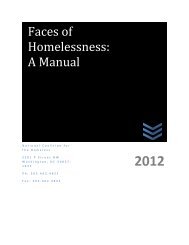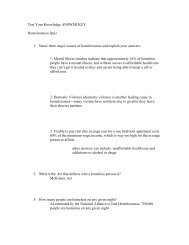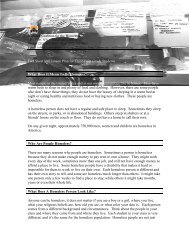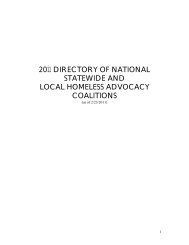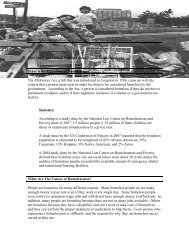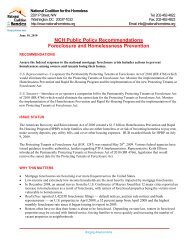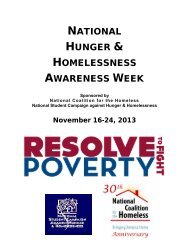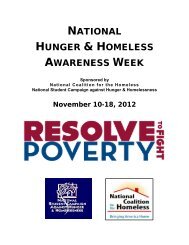The Strength to End Homelessness Lies In The Power of YOUR Vote!
The Strength to End Homelessness Lies In The Power of YOUR Vote!
The Strength to End Homelessness Lies In The Power of YOUR Vote!
Create successful ePaper yourself
Turn your PDF publications into a flip-book with our unique Google optimized e-Paper software.
Yes, you just have <strong>to</strong> re-register.<br />
Am I required <strong>to</strong> work for the party or contribute money <strong>to</strong> it<br />
No.<br />
What is a Sample Ballot<br />
<strong>In</strong> some states, before each election, each registered voter receives a packet <strong>of</strong> information including a<br />
sample ballot, which is a replica <strong>of</strong> the ballot the voter will see at the polls. <strong>The</strong> packet also gives the time<br />
and date <strong>of</strong> the election, the location <strong>of</strong> your polling place, and an application <strong>to</strong> vote-by-mail.<br />
What if I do not receive a Sample Ballot<br />
If it does not arrive two weeks before the election, call and request one from the county elections <strong>of</strong>fice.<br />
Where will I vote<br />
Your polling place will be in your neighborhood. If you receive a sample ballot, the exact address will be<br />
shown on the back. Otherwise, the address will be on your registration card. Both should show whether<br />
the polling location is accessible <strong>to</strong> people with disabilities. Polling places may change from one election<br />
<strong>to</strong> another. It is important <strong>to</strong> go <strong>to</strong> the correct polling place because your name will not be on the roster <strong>of</strong><br />
voters anywhere else.<br />
What if my polling place is not accessible <strong>to</strong> people with disabilities<br />
<strong>The</strong> Voting Accessibility for the Elderly and Handicapped Act requires polling places <strong>to</strong> be accessible <strong>to</strong><br />
persons with disabilities whenever possible for federal elections. Where no accessible locations are<br />
available as polling places, states must provide other means for persons with disabilities <strong>to</strong> vote. <strong>In</strong> most<br />
states, you may vote by absentee ballot, and many states provide voting aids such as telecommunications<br />
devices for the deaf (TDD’s). Check with your county elections <strong>of</strong>fice <strong>to</strong> learn what you should do. If<br />
you prefer <strong>to</strong> vote in person, find out if curbside voting is available. If it is, get as close <strong>to</strong> your polling<br />
place as you can and a precinct board member will bring you a ballot for you <strong>to</strong> cast.<br />
When are the polls open<br />
<strong>The</strong> hours that polling places are open on Election Day varies by state. However, usual hours are from<br />
7:00 a.m. until 8:00 p.m.<br />
Can I vote by mail<br />
Contact your county elections <strong>of</strong>fice for information on obtaining an absentee ballot and about deadlines.<br />
Do I need identification documents when I go <strong>to</strong> vote or register<br />
19





